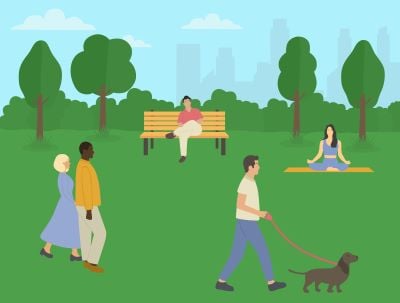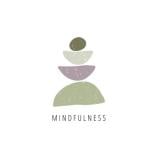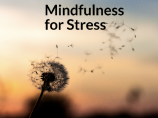The Case for Green Space: A Cost-Effective Mental Health Resource
The Case for Green Space: A Cost-Effective Mental Health Resource

City life is attractive to many people, but seemingly endless high-rises and gridlocked traffic leave little room for city dwellers to reap the benefits that green spaces may have to offer. In our rapidly urbanizing world, more than half of the global population have made their homes in cities. Unfortunately, as we migrate to urban areas, access to green spaces is dropping, which may actually affect our mental well-being.
Individuals residing in cities are:
- 21% more likely to develop an anxiety disorder
- 39% more likely to develop a mood disorder
Might green spaces be able to offer benefits for individuals with an anxiety disorder, depression, or high stress?
What are Green Spaces?
Green spaces are forests, fields, parks (think trees, flowers, grass, or any open area filled with flora-focused features).
Exposure to green spaces has been linked to:
- improved physical and mental well-being
- reduced levels of stress
- enhanced brain function
- increases in physical activity
So how can we take advantage of these green spaces?
Forest Bathing
Forest bathing, a kind of green space exposure, involves putting oneself in a forest environment to experience the healing powers of nature. Adapted from the Japanese “Shinrin-yoku,” forest bathing requires you to remain mindful and intentionally slow down, and just notice the trees, plants, and wildlife.
Forest bathing is rooted in meditation; this means that traditional forest bathing is not just picnicking in the woods – instead, it's all about deliberately immersing yourself in the "here and now" experience without passing judgment, much like many other mindfulness practices. But for those of us who may not be ready to dive into meditation, you may not have to: simply being in the forest has been demonstrated to provide similar benefits.
It's possible that simply being present in a forest could reduce anxiety or depression. The research evidence is not entirely clear, but there are some signs that forest bathing might help ease some symptoms. Research has shown that forest bathing and other exposure to natural environments is linked to a reduction of stress levels.
Success in stress-based studies:
- The Stress Hormone and Its Role: Cortisol, often termed the primary stress hormone, is a key indicator of stress in the body. When facing stress, our body's stress response system activates, releasing cortisol into our bloodstream. This prepares us to cope with perceived threats. Individuals dealing with anxiety and depression tend to have dysregulated levels of cortisol.
- Nature's Soothing Effects: Research conducted across 24 different forests in Japan revealed that spending time in nature leads to decreased heart rate, blood pressure, and cortisol levels, compared to those exposed to urban environments. Surprisingly, these benefits extended not only to walking through forests but also to simply gazing at natural scenes.
- Nature Breaks for Improved Performance: A study focusing on employees showed that spending just ninety minutes twice a week for three weeks to nature-based activities outdoors can enhance visual processing speed, attention, cortisol levels, and reduce burnout symptoms. These activities ranged from leisurely walks to engaging in outdoor tasks like building bird feeders.
Other Unearthed Benefits
- Urban Green Spaces and Mental Health: Transforming neglected areas into green spaces could be a strategy for reducing stress, anxiety, and depression among city dwellers. Communities involved in "greening" vacant lots experienced more significant reductions in depressive symptoms and feelings of worthlessness compared to control groups.
- Time Spent Outdoors for Mental Wellbeing: A study from Australia suggests that spending as little as 30 minutes in outdoor green spaces once a week can lead to a reduction in depressive symptoms. The study proposes that if the global population meets this weekly nature quota, depression prevalence could drop by 7%.
In a world where stress is increasingly prevalent, nature offers a compelling solution for managing it. Whether it's a brief outdoor break during your workday or contributing to the transformation of urban landscapes, connecting with nature may yield improvements in both mental wellbeing and cognitive function. By understanding the science behind these effects, we can harness the power of nature to foster success in even the most stress-filled cities and other life scenarios.
Major Takeaways:
- Green space exposure involves immersion in any space that is “green” – forests, fields, or other natural spaces
- Practicing a type of green spaces exposure—forest bathing—may result in reduced cortisol levels, thereby reducing stress
- Developing and maintaining green spaces in cities could effectively promote city residents’ mental wellbeing
- Spending just a bit more time a week in an outdoor green space can improve and support overall population health
- Nearby green spaces represent a flexible and cost-effective mental health resource that is accessible to countless communities.





















